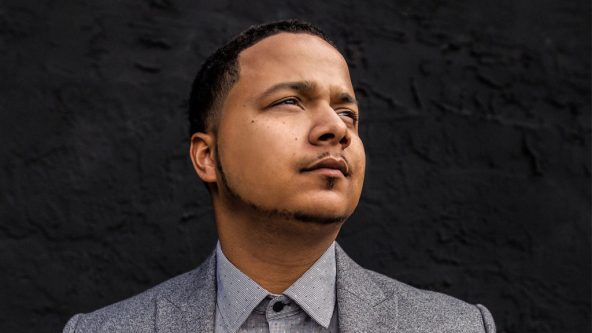By Curtis Bunn
Zenger News
Rescued at two days old by retirement-age couple Nathan and Edith Figgers, Freddie was raised as one of their own. Later, the African-American couple formally adopted him. Both lived to see his extraordinary rise, although Nathan died in 2014 after developing Alzheimer’s disease.
His cousin, Sarah Figgers, had a premonition. “I could tell he was going to be something, be someone,” she recalled. “He was quiet, off into his own world … There was something about him.”
Nine-year-old Freddie became fixated with a broken Macintosh computer that most people would have seen as garbage. Patiently, Freddie dismantled it and, to everyone’s surprise, fixed it.

Freddie Figgers fixed a broken-down Macintosh Classic when he was nine years old and launched a computer repair business at the age of 16. (Image courtesy of Freddie Figgers)
He said the repair job was the spark that launched him as a kid.
“With the way my life started, it was hard to make friends,” said Figgers, now 30. “My best friend was that computer.” When he was a teenager, “I wanted to be an innovator, an open thinker who builds new technology,” he said.
By age 16, with many people coming to him for help, he started his own computer repair company.
That same year he invented a device to help his father, who would leave home in the evening and forget his way back. Unwilling to commit his father to an assisted-living facility, Figgers installed a GPS tracker with a two-way communicator in his dad’s shoes. He could find him anywhere and speak to him through his feet if he walked away from home.
Figgers sold that program a year later to a company in Kansas for $2.1 million.
His next venture didn’t run as smoothly. He lost interest in finishing his college degree and began buying cellphone towers at age 21. He built them in places where reception was spotty, poor or absent, mostly in rural areas of West Virginia, Montana and North Dakota.
The effort nearly ruined him. By his count it took 196 meetings over four years with Federal Communications Commission bureaucrats and examiners, and costly application fees, to get a green light just when his pockets were almost empty.
“I was in D.C., down to my last $30,” Figgers told Zenger News. “I was almost bankrupt before I could really get started.”
He was the youngest person, at age 21, to acquire an FCC license. Now his Figgers Wireless manufactures its own phones and provides cellular, mobile broadband and landline service, and international services on four continents.
And he has invented a device that could change the cellphone industry.
His patented creation makes the traditional method of charging a cellphone’s battery obsolete. It begins wirelessly charging when it enters a room equipped with an inductive charger—akin to the way a phone automatically reconnects with WiFi.
“As soon as the phone is in range, it will start charging,” Figgers said.
The technology will be available first to the nearly one million Figgers Wireless customers around the world, whose phones are equipped with a chip that can link to a wireless charger. Figgers has patented the idea and expects the FCC to grant final approval to begin production near the end of 2020.
Germain Bebe, chief operating officer of the privately held Figgers Communications, told Zenger he expects a wide-open market.
“The excitement is there,” he said. “The product sells itself. … We’re looking at this being a game-changer.”
Following Figgers’ rescue from near a trash heap, Nathan and Edith, who is now 95, poured attention and affection into their son.
“He received a lot of love from his parents. A respectable child,” Sarah Figgers recalled. “And his parents’ eyes lit up every time they talked about him.”
“There were so many roadblocks,” Freddie Figgers said. “It was a challenge. I could tell when they wanted to insult my intelligence with obstacles.”
But Bebe said Freddie never stopped. “He is an aggressive and driven person,” he said. “It’s 24 hours for him. He’s motivated and he doesn’t look at it as work.”
Figgers’ mission includes a charitable arm, the Figgers Foundation, which collects 20 percent of the company’s profits.
The foundation distributes 28 college scholarships to African-American men every year. It assists women with breast cancer. And it has protected girls from sex trafficking in northern Zambia.
“My parents did not tell me one time that I wasn’t their child,” Figgers said. “They were special. They were older and they taught me old-school values.”


